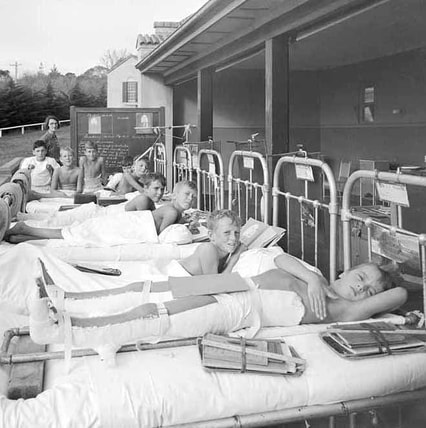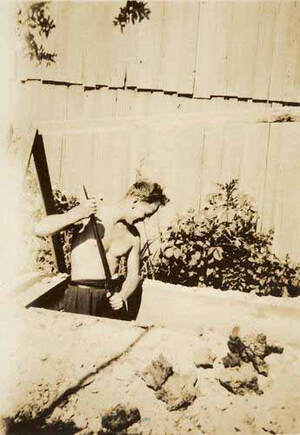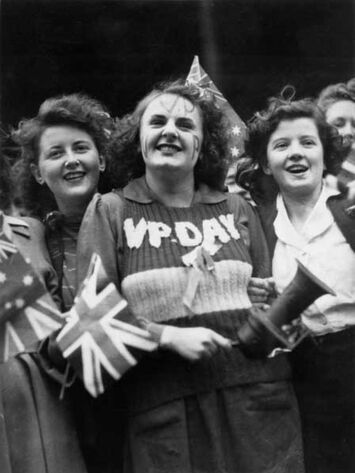 An outdoor school session for children affected by infant paralysis (polio), Frankston Children's Hospital, Jackson's Road, Mt. Eliza, 1936.
An outdoor school session for children affected by infant paralysis (polio), Frankston Children's Hospital, Jackson's Road, Mt. Eliza, 1936. Up to 40,000 Australians, mostly children, developed paralytic polio.
Photo: State Library of Victoria.
By Eulalie Brewster
The polio epidemic
In 1937, when I was in grade five, the polio epidemic meant that for eight weeks we couldn’t go to school and school lessons came through the post. It must have been spring – October and November – and it felt like a holiday. We spent the time building huts, climbing large tea trees in back garden, reading, helping with chores. We had a big garden for play. A friend sometimes came to play. Her older sister had a crippled leg from a polio infection some 10 years earlier.
At the time the illness was referred to as infantile paralysis. Polio was a term that seemed to come in later with vaccines and injections.
I don’t remember feeling scared. We felt safe at home. When we went back to school some of the children wore callipers on their legs and some needed help.
The Great Depression
Before I was old enough to start school in 1932 I can remember occasions when worn-looking men came to our front door asking my mother to buy small items – safety pins, cards of needles from small to darning size, hairpins and shoe laces for only threepence or sixpence. She bought an item when she could but often had to refuse for lack funds as there was not much to spare in our household. She explained to my smaller brother and me that these men had been soldiers but now they had no work so we should help them when we could.
World War Two
I was at Hampton High School when war was declared in 1939. I didn’t listen to the radio news but I saw newspapers and heard family discussions. There was no real fear but an awareness of the changes.
 A Melbourne resident digs an air raid shelter in the backyard. Photo: Museums Victoria
A Melbourne resident digs an air raid shelter in the backyard. Photo: Museums Victoria At home our windows were criss-crossed with sticky paper and night times brought blackouts. My brother and I spent time digging a dug out in the back garden in case of air raids in a coastal area. We couldn’t dig very deep for the pure sand kept falling into the hole.
My mother and grandmother lived through both the first and second world wars. Four of my cousins only a year or two older than I went into the Air Force. One did not return. An older cousin had served in WWI and returned not well but he was called up for duty when the war situation was most serious.
We children accepted it but many school friends were unhappy because they had fathers and big brothers in the Forces.
After finishing high school in Form 5 I became a student teacher at Hampton State School until I turned 18. Then I went to rural training for a fortnight and was appointed to a state school at Sandy Creek beyond Wodonga. This school of 11 pupils was held in a back room of the local hall. Apart from a church building half a mile further up the road and a cemetery half a mile back towards the north that constituted Sandy Creek. The post office was in a front room of a house by the road. It was a long trip from Melbourne to Wodonga to change to rail motor on the old Tallangatta line for Huon. One trip took 14 hours for our train frequently had to go to the side lines while troop trains were on main line.
The next year I went to Melbourne Teachers’ College but only for a year as there was such a shortage of teachers due to war. And that year each of us had to spend one term of the three in a rural school! My bicycle travelled in the guard’s van to each of these wartime rural school appointments so I was able to tour each district and cycle to a nearby rural school to learn from a more experienced teacher for one day.
 Three friends, part of the crowd that gathered in Bourke Street
Three friends, part of the crowd that gathered in Bourke Street to celebrate the end of the Second World War, August 15 1945.
Photo: Australian War Memorial
Next term I was at a rural school at Mt Duneed on the road from Geelong to Torquay. I heard about the dropping of the atomic bombs on Japan from the family with whom I boarded. That was the end of the war in the Pacific. I went with a local family to the thanksgiving service for Victory in the Pacific (VP Day) in Cardinia Park in Geelong. I still have the order of service. I have written in it 15-8-45. It was a fine sunny day and the park was packed. People were subdued for the service but sang the hymns most heartily. At the conclusion they were happy but still fairly subdued.
How did the war change me? I think it gave me a greater appreciation of the differences in people.
Eulie Brewster OAM was born in Melbourne in 1926. She was a founding member of the Inverloch Historical Society and has written four books on aspects of Inverloch’s history.